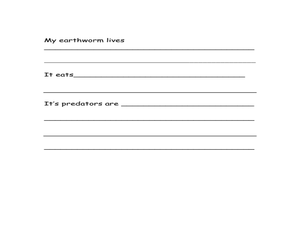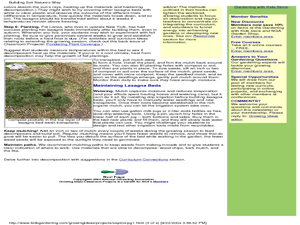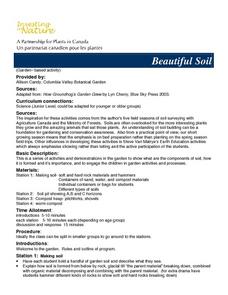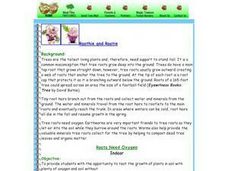Curated OER
Vermicomposting
Third graders study vermicomposting. In this vermicomposting lesson plan, 3rd graders prepare to begin a unit on decomposition by constructing a worm bin. Students collect worms to be used later in experiments.
Curated OER
Vermicomposting
Fifth graders explore agriculture by viewing compost related presentations. In this worm and soil lesson, 5th graders identify the relationship between good soil and the worms who inhabit it by reading assigned text in class. Students...
Curated OER
F.B.I.
Students create a worm bin full of fruit and vegetable scraps wit paper and observe what happens over time. In this decomposers lesson plan, students observe that the fruit and vegetable scraps become new soil.
Curated OER
Researching the Nutrient Cycle
In this researching the nutrient cycle worksheet, students read about the cycle of nutrients, look at the diagram, then answer two questions by doing research on this topic.
Curated OER
Helping the Soil
In this soil conservation activity, students study and analyze two excellent ways to enhance soil conservation: compost heap and leaf-mould. Students review all the ingredients in making both.
Curated OER
How Long Until Dirt
Third graders examine the difference between composting and wasting food. They problem-solve what to do about leftovers after lunches so good food doesn't go to waste.They study food storage techniques that are environmentally friendly...
Curated OER
Earthworm Bridge
Fourth graders complete analysis experiments for decomposers and their adaptable traits. In this decomposers lesson, 4th graders test worm behavior to light, sound, warmth, touch, and moisture. Students work in groups to analyze the...
Curated OER
Rosa Parks Community Garden
Students explore gardening and nutrition in the Rosa Parks Community Garden. They work in stations to discuss food choices, the life cycles of plants, and mini-composting. After starting in one station, they rotate to try each activity.
Curated OER
Earthworms and Making a Wormery
Students explore the environment by researching insects. In this earthworm lesson, students utilize soil and plexiglass to build a see through wormery in which students can observe the worms at work. Students identify the benefits of...
Curated OER
Decomposition, Soil, and Life Cycle Research
Students conduct background research on the decomposition process, soil composition, and the life cycle using the resources provided for Internet searches. They work in collaborative groups to research topics as a particular plant, soil...
Curated OER
Think Green
Learners experience and practice compositing and recycling through hands-on-activities. They distinguish between which items from their trash can be recycled, composted and reused. The process for making recycled paper is also covered in...
Nuffield Foundation
Observing Earthworm Locomotion
One acre of land can contain more than a million earthworms. Scholars collect earthworms to observe their movements. Once placed on paper, the sound of movement often fascinates pupils. When placed on glass, the earthworm is unable to...
Curated OER
Building Soil Nature's Way: Exploring decomposition and soil health
Students explore decomposition and soil health by creating their own garden. In this agriculture lesson, students build a "lasagna garden" with organic matter found in the area and plant perennials native to their region. Students are...
Curated OER
Observing Decomposition
In this science worksheet, students focus upon the concept of decomposition and collect data in order to make interpretations or observations.
Curated OER
Beautiful Soil
Students discover what are the components of soil. They examine how it is formed and it's importance. They engage in garden activities and processes. They hold a handful of garden soil and describe what they see. They take a...
Curated OER
Contrasting Landscapes - UBC Farm Field Trip
Students visit the UBC Farm. In this lesson on various landscapes, students spend a day at the University of British Columbia exploring the farm and trail adjoining the campus. This lesson could be modified for use in any region that has...
Curated OER
Biological Concepts
Learners perform a transection of a redworm. They discuss spinal cord injuries in humans. Students compare the ability of the redworm to regenerate the ventral nerve cord with the inability of humans to repair damage to the dorsal nerve...
Curated OER
Student Designed Investigations: Observations
Students choose an organism and create an experiment with that organism. In this observation lesson, students expose a living thing to something from its environment and record their observations. Students must have some prior knowledge...
Curated OER
Layers of the Forest- Leaf Litter
Students conduct an experiment. In this temperate forest lesson, students discuss what kind of animal life can be found in the forest. They read The Magic School Bus Meets the Rot Squad: A Book About Decomposition and complete an...
Curated OER
Recycling- Multiple Choice Words
In this recycling activity, students complete 10 multiple choice questions, choosing the correct recycling related word that fits a given description.
Curated OER
Recycling Antonyms and Synonyms Worksheet
In this recycling learning exercise, students write antonyms and synonyms for common recycling vocabulary words. Students write antonyms and synonyms for 15 words.
Curated OER
Odyssey of Life, Part II-The Unknown World
Students complete an experiment in which they observe different natural sample in which they uncover the microbial world. They complete a two part worksheet that accompanies the lesson.
Curated OER
Roots Need Oxygen
Students investigate the growth of plants in soil with oxygen and soil without oxygen. They discuss what roots need to survive, and chart the growth of two plants to analyze the difference between plain soil and soil with two earthworms.
Cornell University
Cornell University: Cornell Composting: Composting in Schools
Composting in schools, what's the value in it? Not only will it reduce your waste, it is a great science project. Try it out and learn how the earth "feeds" itself.

























